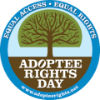Less than a month ago, I posted about Positive Adoption Language. I hate to revisit the issue so soon, but it reached up and smacked me yesterday, so it's on my mind.
Listening to NPR's
Talk of the Nation yesterday, I heard them discussing family reunions. Families separated by various events finding one another again after years. The story that kicked off this segment of the show was two children finding their father who had left years ago. They found him because of a newspaper story about the homeless. It was an interesting story.
Then one of the callers told his story about he and his wife relinquishing a daughter for adoption before they were married. In telling his story, he emphasized that they did NOT give her up, they made a thoughtful, considered decision to place her for adoption. He was insistent on this point, it was as though he had argued with others about the proper language and was familiar with the arguments.
I cringed as I always do. But I also stopped to think about it.
He clearly needed to think that he had done the right thing. (Everything he said about the decision to put the child up for adoption was aimed at explaining how they had done the right thing.) That was his reality. They did what they could. They did what they had thought best. They had not abandoned their child; they gave it to a loving home. He needed people to understand his reality.
And even while I cringed, I could empathize. I understood why he was adamant with his description of his actions, even while I was curious how his wife would describe the event.
While I did understand his need for the language to reflect his reality, I couldn't help but wonder about the adoptee. The fact of the matter is that for many adoptees (please note I didn't say "all"), it does feel as though we've been given up. Often, the biological parents weren't around to explain their reality. And the reality for adoptees is that we have been given up and abandoned.
I get that biological parents often can explain the adoption. They made conscious decisions or they were coerced. I believe that many (most?) did not simply walk away as though it were nothing. The "given up" language seems to paint them in a negative light and ignores the details of the situation that led to adoption.
I do not use the phrase "given up" to accuse my biological mother of anything. I don't do it to invalidate her reality.
I talk about being "given up" for adoption to explain my reality, my experiences. This is what being an adoptee has felt like. I felt given away. I felt abandoned. I don't want to pretty up the language to spare someone else's feelings, not because I want to hurt them, but because it hurts me. It does violence to my feelings, my reality. Changing the language might more accurately reflect the experiences of the relinquishing parents, but it invalidates my own feelings and experiences.
I do not mean to hurt any parent when I talk about being "given up." But please don't ask me to stuff my own feelings in order to spare someone else's. If you would ask me to empathize with the adults in my adoption situation, surely you can understand my own desire to have those adults empathize with the adoptee.



